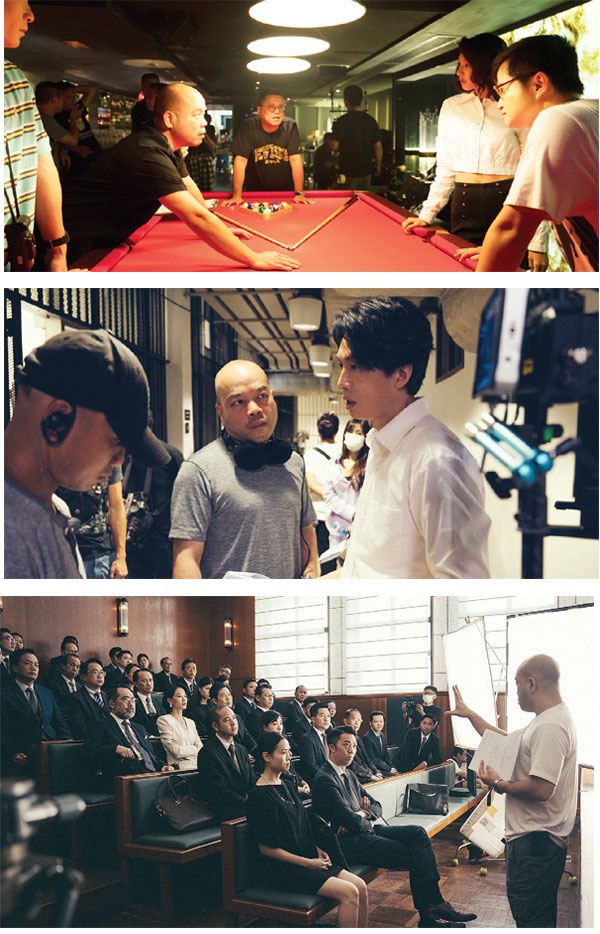A palpable hit


The fourth installment of our series on groundbreaking works by Hong Kong artists this year turns the spotlight on filmmaker Jack Ng, whose debut feature, A Guilty Conscience, turned out to be the highest-grossing Hong Kong-made film of all time. Ng also succeeded in busting the myth that local moviegoers do not care for serious subjects, using the framework of his legal drama to investigate the anxieties and class schisms in Hong Kong society. Chitralekha Basu reports.
Hong Kong people love an underdog, says film critic Elizabeth Kerr, who has been watching the local film scene for nearly two decades. She is referring to Adrian Lam, the small-time defense attorney protagonist of this year's runaway hit, A Guilty Conscience. In the Jack Ng-directed film, Lam is determined to get justice for his client Jolene Tsang - wrongfully convicted of killing her child by negligence. The defense is pitted against a powerful and devious bunch who, having framed an innocent woman, are trying every trick in the book to keep her behind bars.
Kerr calls A Guilty Conscience "a David-vs-Goliath narrative that touches on the social anxieties and class schisms in Hong Kong society. It's no surprise that the film hit a nerve".
It also set a box-office record. A Lunar New Year release, A Guilty Conscience went on to become the highest-grossing Hong Kong-made film of all time. Up until November, it had collected HK$115.06 million ($14.73 million) in Hong Kong alone.
Crossing the 100-million-dollar mark is a powerful symbol of Hong Kong cinema coming into its own. In Hong Kong, a film raking in HK$30 million to HK$35 million is considered good news - a sign of viewers returning for a second helping. So when a director's debut feature - and that too a dialogue-heavy legal drama - makes it past the 100-million-dollar bar, it's nothing short of a paradigm shift. Earlier, it took an action or horror flick or a comedy to win Hong Kong audiences over. But A Guilty Conscience has demonstrated that one doesn't need a formula to deliver a hit.
The revenue made from the film took Ng and his team by surprise, to put it mildly. "When the box-office figures started climbing, it felt like we were witnessing a miracle," he says, hoping that studio owners will be persuaded by the film's success to take a chance on other filmmakers who think outside the box. "Now that they know that it's not just genre films that do well at the box office, I think they would be more willing to take risks."
Research, role play, rewrite
A Guilty Conscience could have been a documentary. At its center is a fictionalized re-telling of a real-life criminal trial. The script was developed through trial and error, almost like a lab experiment. Members of Ng's core creative team took turns at role playing, trying to reconstruct scenes based on documented legal history. The dialogue was improvised. Katy Chung, a practicing barrister, was ready at hand to offer professional insights. Ng, who co-wrote the film with Terry Lam and Jay Cheung, says he lost count of the number of times the team went through the cycles of research, role play, and rewrites over the one and a half years that the script was in development.
"I've been a scriptwriter for more than 20 years, but this was a unique experience even for me," Ng says.
After singer and stand-up comedian Dayo Wong was cast in the lead role, some of his mannerisms and personal quirks were written into the script. Borrowing certain traits from Wong's stage persona, Ng turned Lam's character into a lean, mean, clumsy motormouth, prone to putting his foot in the wrong place - the very attributes Wong's numerous fans have missed seeing him enact to perfection since he retired from doing stage shows in 2018.

Does the end justify the means?
At the beginning of the film, Lam is on a downward spiral. He loses his position as a barrister for unbecoming conduct. Blinded by hubris, he fails to foresee a key witness turning hostile - a case of snatching defeat from the jaws of victory. His client gets 17 years in prison for a crime she did not commit. Riven with guilt, Lam vows to have the case reopened and bring the guilty to book. He also stops cultivating rich people and takes pro bono cases to do his bit for the underprivileged and the downtrodden. However, his methods can be rather unorthodox. He collects incriminating evidence against the guilty party by secretly filming a private conversation; tries, unsuccessfully, to manipulate a morally upright public prosecutor into getting disqualified and breaks court procedure by speaking out of turn and directly to the jury.
Is the director telling us through Lam that the end justifies the means?
Ng says sometimes it might be necessary to stray from the straight and narrow, especially "when your opponent is breaking the rules" and a doggedly moral approach may not necessarily help the cause.
"Is it worthwhile to hold on to the moral high ground at the cost of an innocent person getting hurt? Can you have a clear conscience if a person ends up in prison because you took a moral position?" he asks.
The conflict between righteousness and pragmatism raises the film above genre thrillers in which characters are often painted in black and white. Tse Kwan-ho plays the no-nonsense, principled public prosecutor Kam Yuen-shan, exuding a Zen-like calm - the perfect antithesis of Wong's bungling drama queen of a defense attorney. Ng says he conceptualized the two characters as opposites who might be more similar than they appear at first glance. "This is hinted at in their names. The shui in Adrian Lam Leung-shui translates as 'water' while the shan in Kam Yuen-shan denotes 'mountain'," he explains. "I took the cue from the Chinese proverb 'Mountains and waters meet naturally' (Shan shui you xiang feng)."
In the end, Lam and Kam are seen putting the judicial system, and by extension, society as a whole, on trial. Both take huge professional risks in order to call out the perpetrators of institutional corruption. Ng defends his decision to present an idealized picture - of a world where those who make mistakes get a second chance to redeem themselves, and the guilty get their comeuppance. "While we do not live in an ideal world, I want viewers to find hope through my film. Be it in a courtroom, or in real life, be it about work, family or friends, it's important to live in hope."
The film has proved to be a positive catalyst for at least one viewer. Earlier, he used to be a reluctant juror, but had a change of heart after watching A Guilty Conscience. He now looks on jury duty as an important civic responsibility. He has let Ng know that the next time he is summoned, he is going to keep in mind Lam's advice to the jurors about relying on their common sense.
Rooted in the local soil
A Guilty Conscience is a gripping psychological thriller reminiscent of classic Hollywood courtroom dramas such as Billy Wilder's Witness for the Prosecution (1957), Sidney Lumet's 12 Angry Men (1957) and Robert Mulligan's To Kill a Mockingbird (1962), though its theme and sensibilities reflect a skillfully crafted portrait of contemporary Hong Kong society, warts and all.
"A Guilty Conscience has captured the style and texture of Hong Kong films made in the '80s and '90s - the golden period of Hong Kong cinema," says Gipsy Chang, former head of screen production at the Hong Kong Academy for Performing Arts' School of Film and Television. "It brings to mind films like Stanley Kwan's Rouge (1988) and John Woo's A Better Tomorrow (1986) - films that come with a texture that's rooted in Hong Kong."
If the director has found a way of putting together an authentic version of Hong Kong's social fabric, he says he owes it to his growing up in a public housing estate - the sort of environment where one could tell what was cooking next door. By the time he was in secondary school, Ng had decided he was going to be a filmmaker. He had already watched a whole lot of art-house films from around the world, courtesy of his older sister, who was a fan of international film festivals and would bring him along.
"I probably watched more films when I was in secondary school than I did as a film student at the HKAPA," Ng says.
And yet it took him almost 23 years since he received his degree in film direction to actually direct his first film.
Chang, who taught Ng at the HKAPA, says the wait was worth its while.
"He always had very definite ideas about the sort of film he wanted to make - a large-scale drama, based on life experiences," she reveals. "Also he is very patient. He has spent the years since his graduation in 2000 in the movie industry writing scripts, developing his skills in storytelling, gathering life experiences. All of those things accumulate."
"So when the chance came, he was prepared to grab it," Chang adds.
Ng agrees. "I think the subject and the genre I was interested in required a certain amount of life experience, including social and professional experience. I don't think I had enough experience in my 20s or even my 30s to be able to make A Guilty Conscience. So I took my time. Luckily, I have always found work as a screenwriter."
In many of his 17 screenplays for feature films, including the one for A Guilty Conscience, there is a lost soul trying to grope their way back into finding a purpose in life.
"Often my stories are about the protagonist's quest for redemption," says the filmmaker. "I think some of the best stories are about people making mistakes."
So when Edko Films offered him the chance to turn director, Ng, once again, opted to tell a story about a man who makes an error, "for even after being a screenwriter for so many years, it seemed to me that I hadn't had enough fun with the subject or discussed it enough or plumbed its depths adequately".
Chen Zimo and Billy Wong contributed to this story.
Contact the writer at basu@chinadailyhk.com
- Behold the world's tallest bridge
- Xizang celebrates Farmers' Harvest Festival with events
- Beijing forum explores AI's role in cultural sector
- Hong Kong lowers typhoon alert as Ragasa edges away
- Heilongjiang and Chongqing celebrate Farmers' Harvest Festival
- Xi visits exhibition marking 70th founding anniv. of Xinjiang Uygur autonomous region





































